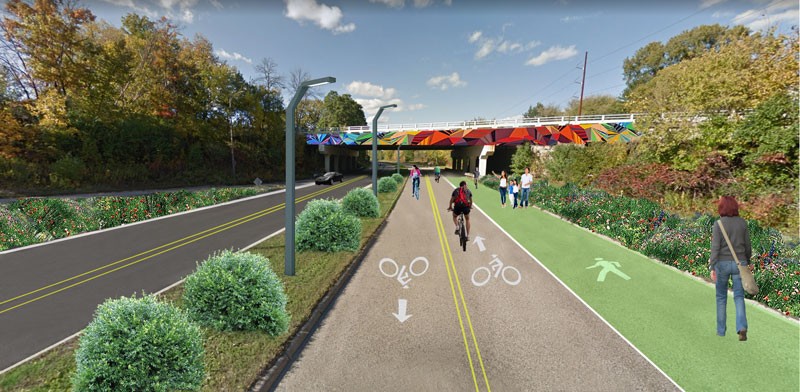"We don't get a citywide bike network by not voting for a new bikeway"
~ Saint Paul City Councilmember Mitra Jalali
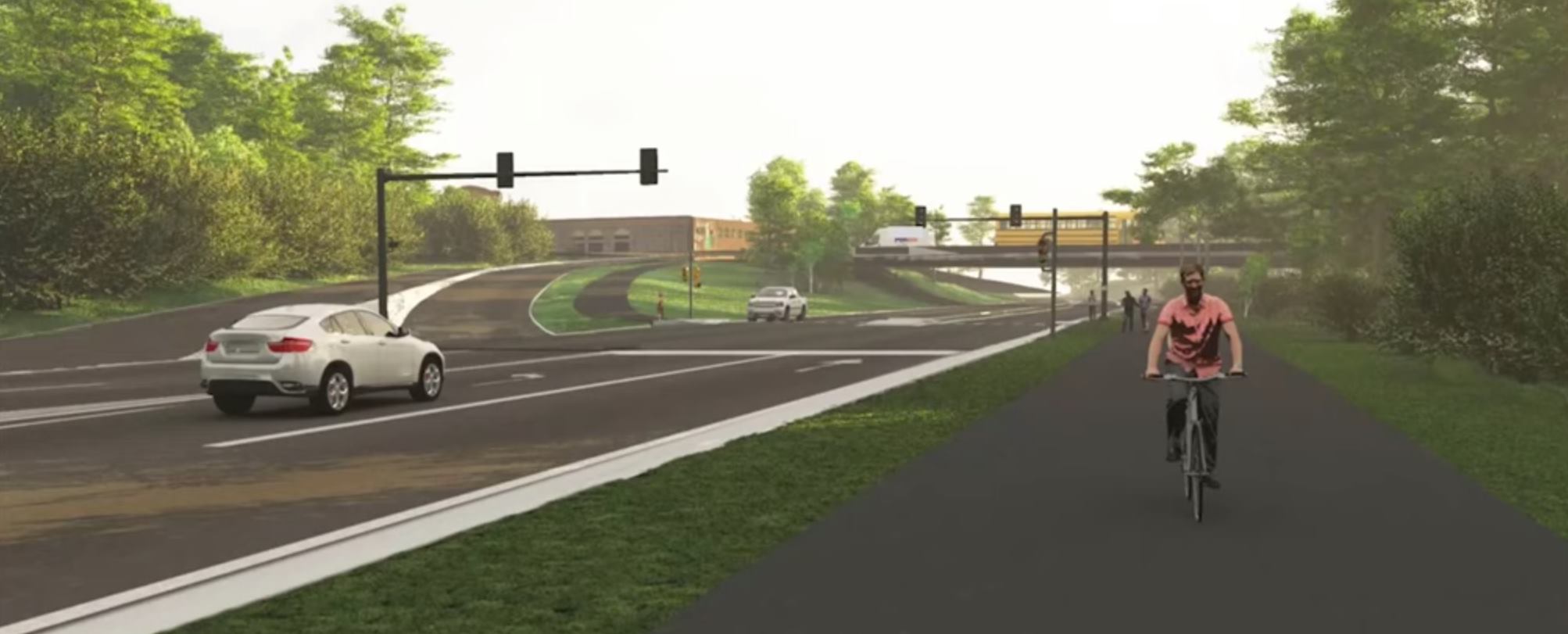
On the 50th Anniversary of Earth Day, the Saint Paul City Council voted to remove one lane of car traffic on Ayd Mill Road to make room for a walking and bicycling trail. For Saint Paul non-motorized transportation, it was one of the biggest political wins of the last twenty years. Mayor Melvin Carter called the passage of this vote “historic.” It may also be the first highway-lane removal in the State of Minnesota.
History
The vote to approve a trail for people bicycling and walking was just the latest chapter in a fight that stretches back to the early 1960s. "Ayd Mill" or "The Short Line Road" was originally constructed as part of a planned connector highway between the then-unbuilt Interstates 35E and 94. For thirty years, Ayd Mill sat unconnected to either highway and saw very little use. In the 1990s, Mayor Norm Coleman put together a citizens advisory group to decide what to do with the road. To many people's surprise, the group chose to get rid of the road entirely and create a linear park. But Coleman and the Planning Commission ignored that recommendation and forced through a flawed Environmental Impact Statement that advocated for a connected 4-lane highway. In 2002, subsequent mayor Randy Kelly unilaterally opened the south end connection to I-35E despite strong community opposition. He tried to connect the north end to I-94 but public pressure and a lack of funding stopped him.
Vision
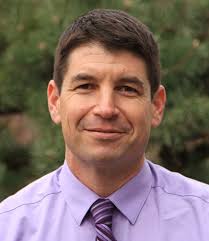 Leading the opposition was a local group called Neighborhoods First who, more than anyone else, kept the dream of a linear park alive. In 2008, then-Councilmember Russ Stark created a Greenway Committee to look into extending the Minneapolis Midtown Greenway into Saint Paul. As part of its work, the committee looked into putting a bike trail along Ayd Mill Road only to find that the adjacent land was owned by CP Rail. When the City tried and failed to negotiate an easement on CP Rail land for a bikeway, they attempted to take some land by eminent domain. But, in 2009 the lawsuit was thrown out on a motion to a federal statute that forbids anyone but the federal government from taking railroad land. So the only option for a trail was to take away one or more highway lanes of Ayd Mill Road.
Leading the opposition was a local group called Neighborhoods First who, more than anyone else, kept the dream of a linear park alive. In 2008, then-Councilmember Russ Stark created a Greenway Committee to look into extending the Minneapolis Midtown Greenway into Saint Paul. As part of its work, the committee looked into putting a bike trail along Ayd Mill Road only to find that the adjacent land was owned by CP Rail. When the City tried and failed to negotiate an easement on CP Rail land for a bikeway, they attempted to take some land by eminent domain. But, in 2009 the lawsuit was thrown out on a motion to a federal statute that forbids anyone but the federal government from taking railroad land. So the only option for a trail was to take away one or more highway lanes of Ayd Mill Road.
In Spring, 2019, Mayor Melvin Carter proposed using some leftover street maintenance money to repave the roadway. It hadn't been repaved since Randy Kelly opened it in 2002 and was in such miserable shape that the city was spending a third of the entire annual pothole budget to patch and fill holes in it. Bicycle advocates, linear park advocates, and Midtown Greenway Extension advocates banded together and demanded that the mayor include a bicycle and pedestrian trail as part of the repaving. The area is designated for an off-street trail in the city's Bikeways Plan, in its Pedestrian Plan and in Ramsey County's bike plan-- all of which see it as part of a Midtown Greenway Extension, across the Mississippi River and down the Ayd Mill Corridor to Jefferson Avenue.
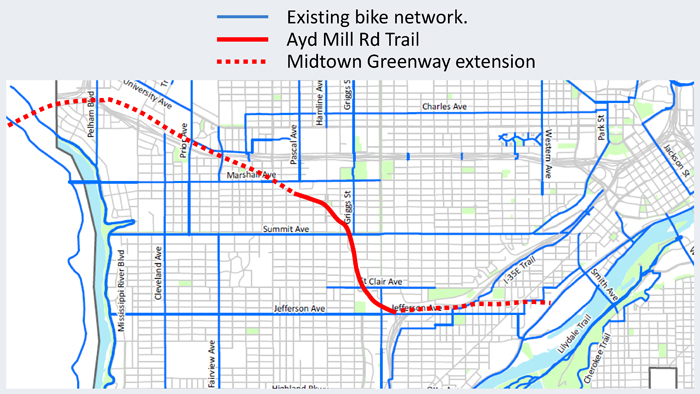
The mayor proposed reducing Ayd Mill from four to two lanes, using the eastern two lanes as a bikeway and linear park. As this proposal was investigated more carefully, it's costs began to rise because it would have required creating new left turn lanes at St Clair, Grand and Hamline Avenues, adding over $2.3 million to the cost of the project. To save money, it was decided to just take away a single lane of traffic on the east side and keep one north-bound lane for cars (which already had left-turn lanes). Even with this, the cost of the project ballooned to $7.5 million, much of it for drainage repairs, and many City Council members were balking at the cost and worried about its impact on neighborhood traffic.
Action
It took epic amounts of advocacy by thousands of people to persuade the City Council to approve the Ayd Mill project. Before the COVID19 pandemic, advocates met with all councilmembers. Twelve groups came together to issue a joint statement, including Sierra Club, Saint Paul Bicycle Coalition, Midtown Greenway Coalition, Union Park District Council,Move Minnesota, Bicycle Alliance of Minnesota, Major Taylor Bicycle Club of Minnesota, Sustain Saint Paul, Neighborhoods First, and Friends of the Mississippi River. Collectively, the coalition generated thousands of emails and calls to city councilmembers. In the end, a slim majority (4 -3) supported the historic proposal. Yeas: Council President Amy Brendmoen, Councilmembers Mitra Jalali, Nelsie Yang, and Jane Prince. Nays: Councilmembers Dai Thao, Rebecca Noecker, and Chris Tolbert.
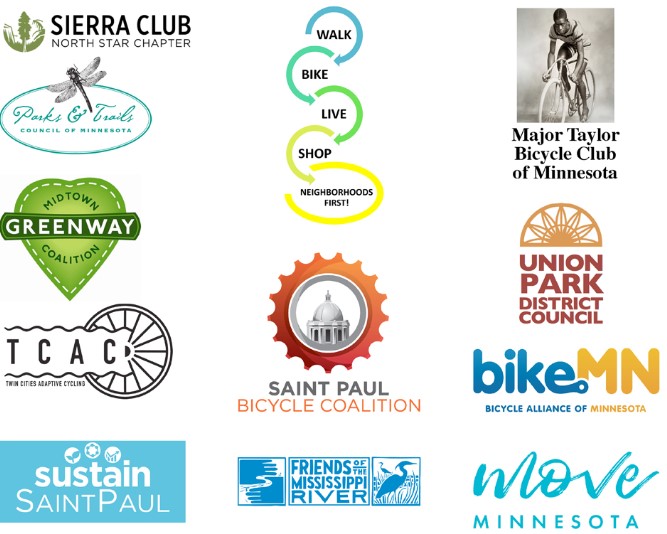
A Historic Connection
The trail isn't perfect but as Councilmember Prince said, "it's a foot in the door." It will be a useful north-south connector for people bicycling, running, walking their dog, or folks who just want to find some social distance outdoors during this pandemic. It will have three connecting paths with crosswalks and traffic signals to Saint Clair Avenue, Grand Avenue and Hamline Avenue (at Ashland). It will connect to the Jefferson Bikeway at the south end, and Selby Avenue at the north end.
Most importantly, Ayd Mill is a key piece of the Midtown Greenway Extension, and a shining moment where the City of Saint Paul chose people over cars. The trail and road repaving is going out for bid this spring and could be completed by the end of September, 2020.
Andy Singer is co-chair of the Saint Paul Bicycle Coalition. He is a professional cartoonist and illustrator and has authored four books, including his latest, "Why We Drive," which examines environmental, land use and political issues in transportation.
For more info:
https://streets.mn/2020/03/27/the-case-for-the-current-ayd-mill-road-proposal/
https://streets.mn/2014/06/17/imagine-an-ayd-mill-linear-park/
